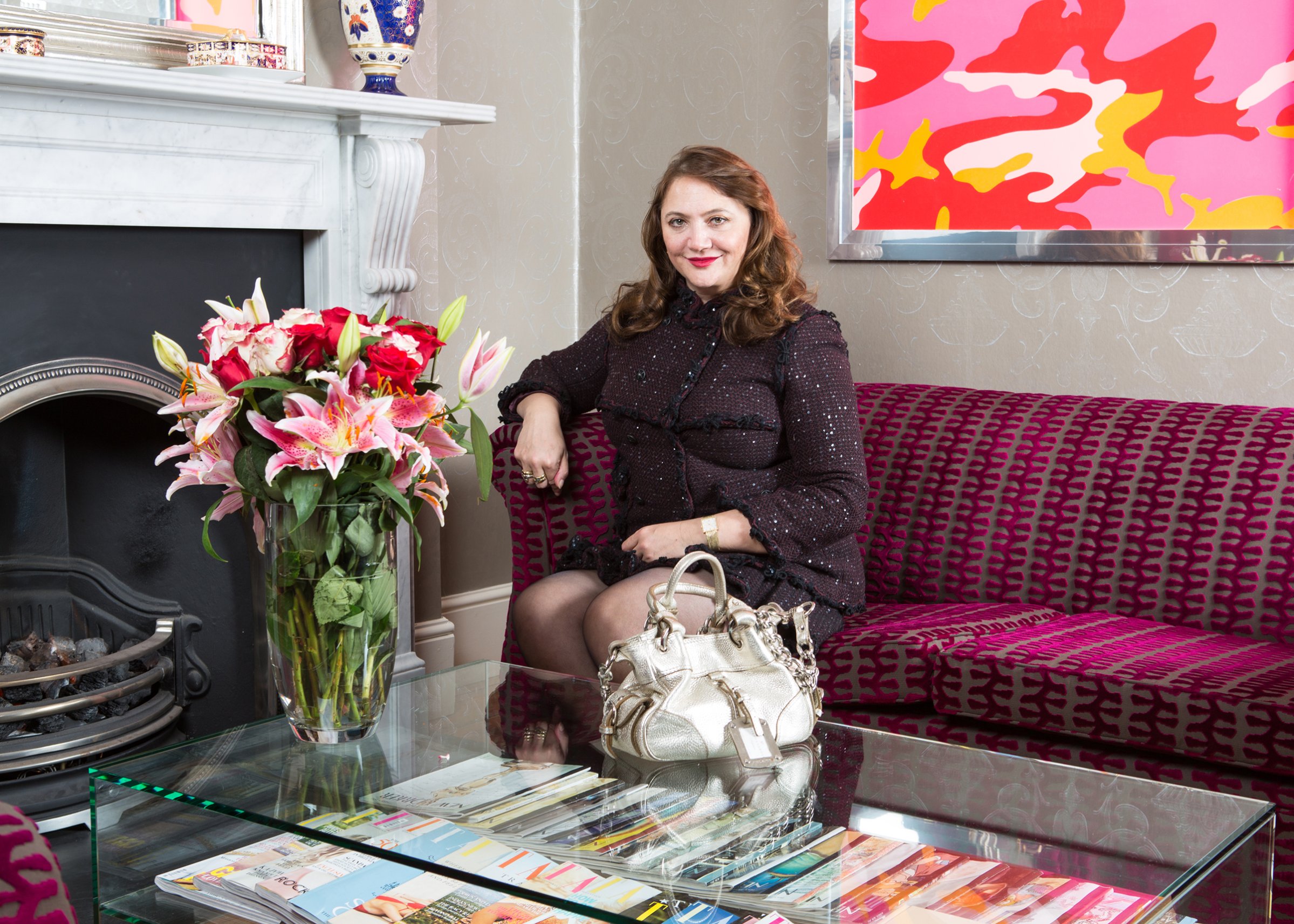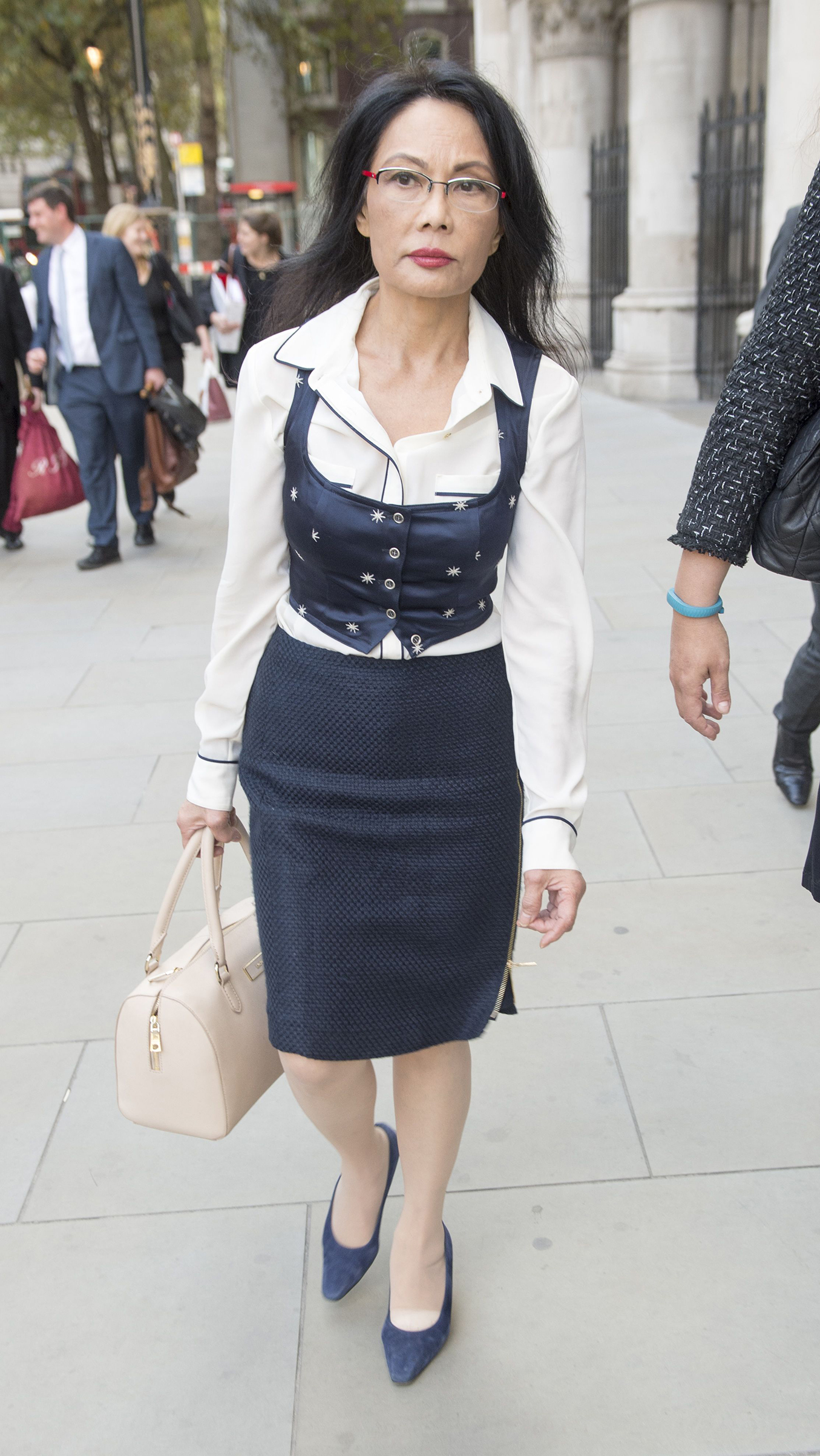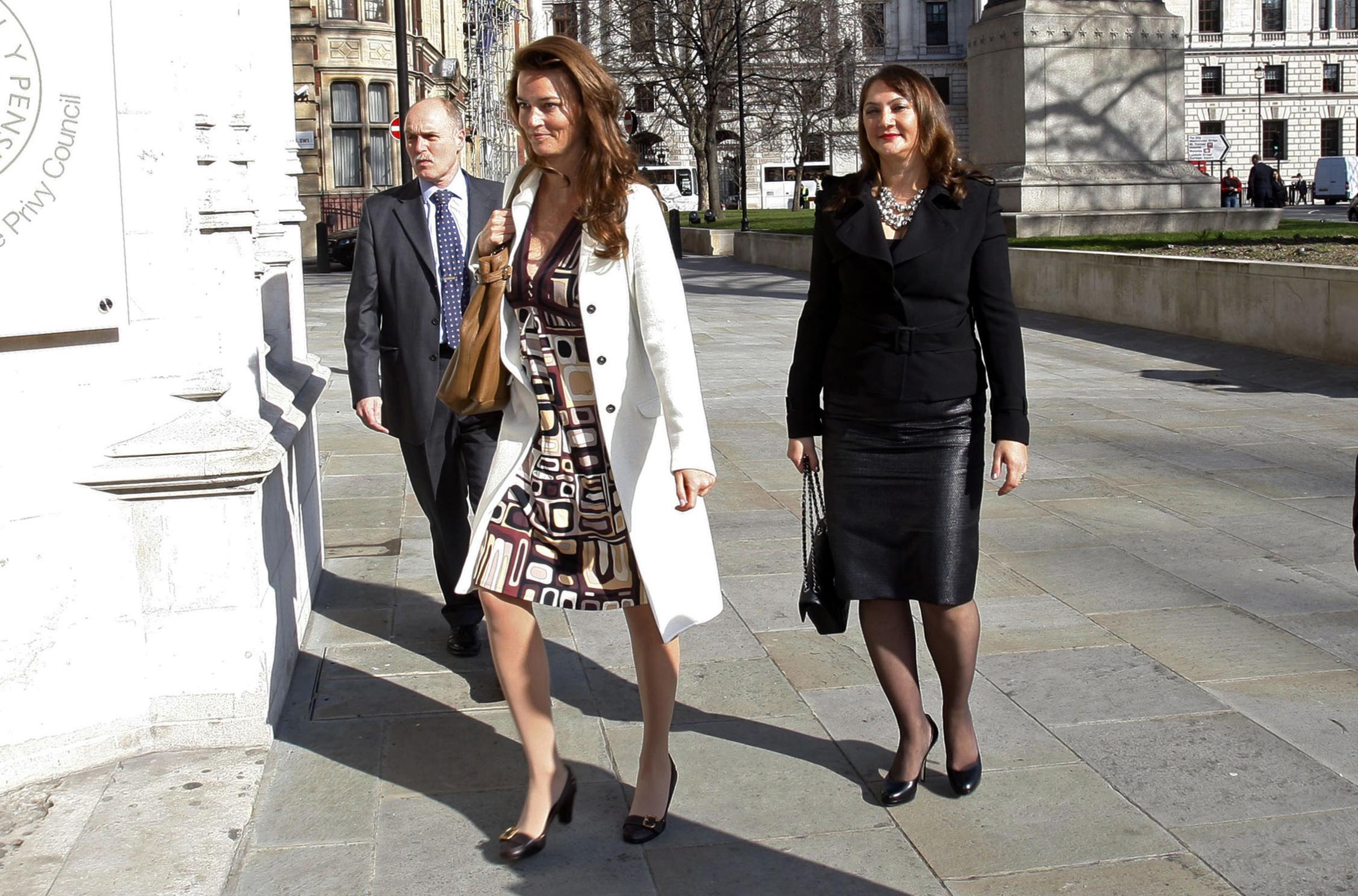
Pauline Chai seemed to have everything. The former Miss Malaysia spent over four decades married to the scion of one of her country’s richest families, enjoying a life of almost unimaginable wealth among the global elite.
But in 2013, Chai filed for divorce, citing irreconcilable differences. She later said in court that she decided to leave Khoo Kay Peng — the multimillionaire owner of retailer Laura Ashley — because the relationship had turned “abusive [and] oppressive.”
But Chai did not pursue her divorce in Malaysia. Instead, she turned to England, where she owned a property. “I know the court system in England is very fair and I have high respect for it,” Chai tells TIME, speaking over the phone from Canada. And she wanted only one lawyer to help her fight for her share of a quarter billion dollar fortune, including homes in the U.K. Malaysia, Canada, and Australia: Ayesha Vardag, the so-called “diva of divorce” whose star clients have made her a tabloid fixture in Britain.
The English court system, centered in the capital city of London, is widely regarded as the best place to divorce for the financially weaker spouse. Although only a small number of ‘big-money’ cases are heard in public, they have helped cement London’s reputation as a favored location for spouses of the super-rich to secure huge divorce payouts.

One-percenters have long flocked to the world’s top financial center — drawn to its multimillion dollar properties and its favorable tax regime for “non-dom” residents who claim their primary home is abroad. When so-called ultra-high net worth (UNHW) people — with investable assets totaling more than $30 million — decide to end their marriage, the English courts often carve up their assets surprisingly equitably.
In 2014, a judge granted the American ex-wife of businessman, Chris Hohn, 36% of their $1.5 billion fortune. In 2017, Russian oligarch Farkhad Akhmedov was ordered to pay £453 million ($629 million) to his ex-wife Tatiana in what is thought to be one of the biggest divorce awards in history. One lawyer commenting on the high settlement figure said the unparalleled generosity of the English courts “is rooted in the fundamental principle that breadwinners’ and homemakers’ respective contributions to a marriage are of equal importance.”
There are other reasons for this relatively equal split of capital. Unlike in American civil law jurisdictions like New York, non-marital assets, like inheritances, are factored into the final settlement. Pre-nuptial agreements are not legally binding — though they are sometimes upheld — and Britain follows common law, in which judicial rulings and legal precedents help decide a case, rather than ordinances and statutes. This gives British judges far more discretion to redistribute assets than their American counterparts.
British judges have had to defend themselves against the criticism that they are “motivated by antiquated notions of chivalry” in supporting this system of long-term maintenance payments and divorce payouts. U.K. Supreme Court Justice Lord Wilson said judges have to “strike a difficult balance” and that even if it is a “running sore” for an ex-husband to pay maintenance for many years, it is “usually unrealistic to tell a wife, left on her own perhaps at age 60 after a long marriage, that, following payments for say three years, she must fend for herself.”
In recent years, a small tribe of divorce lawyers has emerged to cater to the nearly 5,000 UHNW individuals who reside in London. Among them is Vardag, 49, the eponymous founder of London law firm Vardags. A former opera singer, Vardag built her firm up over a decade from a room in her apartment to a $15 million firm with offices in London and Dubai. An hour of her time costs $1,000 and she won’t touch a case unless assets of more than $100 million are at stake. Since hiring Vardag in 2013, Chai has paid $6.5 million to her firm. “What you pay could be the difference between winning or losing,” says Angeline Francis Khoo, 34, one of Chai’s five children. “I think Mom would say she wasn’t bothered about the cost because she knew she was getting the best and you pay for that expertise.”
“She has presence,” Chai says of her first impression of Vardag. “Her background showed she really understood women, and you really understood when meeting her that Ayesha is a fighter.”
Vardag was raised in the city of Oxford in a household that was “utterly financially stretched,” she says, now sitting in her wood-paneled office overlooking St Paul’s Cathedral. To pay the bills, her English mother worked as a secretary by day and at night typed postgraduate doctoral theses for students. Vardag hardly knew her father, Asaf Vardag, who is a Pashtun-Pakistani politician of royal descent. His work kept him in Pakistan, and his brief visits to the U.K. stopped after her mother filed for divorce when Ayesha was 14-years-old. Vardag threw herself into work, gaining a scholarship to a prestigious high school in Oxford, eventually gaining a degree in English literature and a masters in law at the University of Cambridge, before starting a career in commercial law.
She got a first-hand taste of the cloistered world of big-money divorces in 2001, when she hired Raymond Tooth— who famously represented the wives of Eric Clapton, Jude Law and billionaire Roman Abramovich—to help with her divorce from her first husband, who was a partner at one of the country’s biggest law firms, Linklaters.
Tooth was impressed by Vardag’s grasp of the case, she says, and later offered her a job. The idea of working in family law instantly appealed. “It was a human experience,” the softly-spoken Vardag says. “What’s fascinating about family law is it’s the sex and love and children and home and family… the roots of our existence.”
Yet she stayed at the firm only 10 months. She left the firm to become a law lecturer at Queen Mary’s University of London, after which she decided she would be better off launching her own firm, tapping into her social network for clients. Vardag — who claims to be shy — spread the word by attending every high-society party, ball and gala in London. “God, I remember one person saying, “You’re the ultimate social butterfly,”” she laughs.
Tooth doesn’t remember it quite the same way. He accused Vardag’s firm of stealing clients through a sponsored Google advert that Tooth claimed presented him as past his prime. Vardags denied liability but settled the case out of court by agreeing to pay more than $5,000 in damages and nearly $54,000 in costs. “Maybe I am very old-fashioned, but it is a very private business,” he tells TIME.
(In response, Vardag says it was nothing personal. “One of our marketing people had put up some artwork thing that he didn’t like, but it was actually quite complimentary about him,” she says. “I don’t want to be bitchy about him.”)

Her big break came in 2010, when she worked on the case of German paper industry heiress, Katrin Radmacher, who is worth $100 million. The Supreme Court ruled that Radmacher’s German prenuptial agreement was enforceable, a first in England and Wales, but stopped short of making ‘prenups’ legally binding on a statutory level. “That was amazing, because it changed the course of English legal history,” Vardag says of the outdated approach that came from a time when divorce was deemed illegal. “Nobody thought I could do it.”
Building a case is about “telling the story,” she says — with as much colorful detail as you can get. “A client once brought us a big box of sex toys that her husband was using with his mistresses” she says of a case. Another client believed her husband joined a cult. Like a scriptwriter creating a narrative arc, Vardag would use those details to help her communicate the dynamics of her clients’ married life and convince the judge in the process.
In the complex world of high finance, it’s also about research. Vardag’s husband, Stephen Bence, runs the firm’s financial forensic department, which uncovers offshore trusts and unravels convoluted corporate structures that can be repurposed to hide money from spouses. “When you’ve got those in play, it can look like they’ve got very little money,” she says. Bence ended up finding more than a $100 million in assets for Chai’s husband.
In that case, however, it was proving jurisdiction that required the hardest work — ensuring the case would be heard in the English court system. Khoo argued their main place of residence was in Malaysia, while Chai said it was their Hertfordshire mansion, 30 miles north of London. Vardag only had 15 hours to find evidence. She marshalled the entire office, from the directors to the personal assistants to the paralegals, to sift through 10 years of emails in a bid to prove that Chai mentioned her English home in her emails more than any other property. By 2am on the morning of the hearing, they had gathered enough proof to show it was Chai’s primary home. “I win by being cleverer, working harder, being more strategic, digging deeper, and just going the extra mile. I don’t have to play dirty,” she says.
There’s also an element of self-promotion. The media-friendly mother of three appears regularly on television and is happy to court the press for the sake of her clients. In Chai’s case, which the court made public, the press pounced on details, which included a padded toilet seat because Khoo spent hours working and reading on the lavatory and Chai’s thousand-strong collection of shoes; The Daily Telegraph called it “a fascinating insight into the lives of the super rich.” This friendliness with the media has raised the hackles of some in the competitive world of big money break-ups. “All she does is publicize herself and people come to believe it,” says Tooth, her former mentor.
None of that will matter, though, if there are no UHNW clients to service. And the U.K.’s looming departure from the European Union is casting a shadow over the city’s future as a financial center. Cities like Frankfurt and Paris have been wooing London’s banks, along with the senior investment types who help fuel the U.K.’s $1 billion divorce industry.
Vardag, who says she voted for Britain to leave the E.U., is unfazed. “London is the divorce capital not because of the E.U.,” she says. “It’s largely because an awful lot of the world’s super-rich have come to park their wealth here due to tax breaks. They certainly don’t want to live in France.”
Divorces in the U.K. may have dropped by nearly 30% since their peak in 1992— when 165,018 couples divorced. But Vardag says that the majority of ‘big money’ divorce payouts, usually involving non-British couples from Asia, the Middle East and Russia, are getting larger.
And business remains good, for now. In April 2017, the High Court ordered Khoo to pay Chai a settlement worth more than $85 million, which experts put as one of the biggest divorce payouts in recent history. “I don’t know that the case could have been won with anyone other than Ayesha,” Chai says.
More Must-Reads from TIME
- Why Trump’s Message Worked on Latino Men
- What Trump’s Win Could Mean for Housing
- The 100 Must-Read Books of 2024
- Sleep Doctors Share the 1 Tip That’s Changed Their Lives
- Column: Let’s Bring Back Romance
- What It’s Like to Have Long COVID As a Kid
- FX’s Say Nothing Is the Must-Watch Political Thriller of 2024
- Merle Bombardieri Is Helping People Make the Baby Decision
Contact us at letters@time.com